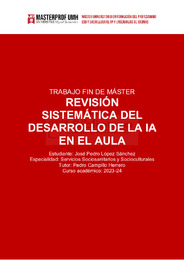Por favor, use este identificador para citar o enlazar este ítem:
https://hdl.handle.net/11000/33151Revisión sistemática del desarrollo de la IA en el aula
| Título : Revisión sistemática del desarrollo de la IA en el aula |
| Autor : López Sánchez, José Pedro |
| Tutor: Campillo Herrero, Pedro |
| Editor : Universidad Miguel Hernández |
| Fecha de publicación: 2024-06 |
| URI : https://hdl.handle.net/11000/33151 |
| Resumen : La veloz evolución de la Inteligencia Artificial (IA) ha tenido un gran impacto en muchos de los ámbitos de la vida cotidiana pero también en la educación, transformando por completo los enfoques tradicionales. La IA en el ámbito educativo promueve la reflexión sobre la interacción entre profesores y alumnos, ya que cambia la forma en que se relacionan con el conocimiento. Entre los aspectos beneficiosos, este progreso tecnológico presenta resultados adaptativos e innovadores, que permiten la individualización del proceso de enseñanza-aprendizaje. Las herramientas de la IA analizan los datos del estudiantado con el fin de describir patrones y ofrecer sugerencias individualizadas, lo que facilita la creación de ambientes de aprendizaje mejor adaptados a las necesidades del alumnado. Así mismo, mejora la rapidez de la retroalimentación y la comprensión por parte del estudiante. Sin embargo, la puesta en práctica de la IA en la educación también plantea algunos conflictos morales y éticos, como la protección de datos y la igualdad para acceder a la educación, que a su vez se ven comprometidas por la brecha digital. Este proyecto consiste en un estudio realizado mediante una recuperación de datos enfocada desde el paradigma descriptivo y se basa en el protocolo PRISMA de revisiones sistemáticas. Durante el proceso de búsqueda se analizó documentos de literatura científica y se obtuvo una muestra de 18 artículos científicos publicados en los últimos 6 años con el fin de determinar la importancia de la IA en la educación. La revisión documental destaca que la IA no puede reemplazar a los educadores por completo, pero enfatiza que es imprescindible encontrar el equilibrio entre tecnología e interacción humana. También se resalta el valor de tratar asuntos éticos y asegurar el equitativo acceso a estos instrumentos para una implementación apropiada de la innovación. Pese a los desafíos, la IA se alza como un instrumento útil para la educación actual, enfocada a la individualización del aprendizaje y a la necesidad de abordar asuntos éticos para obtener el máximo de sus beneficios en el siglo XXI The rapid evolution of Artificial Intelligence (AI) has had a major impact on many areas of everyday life but also on education, completely transforming traditional approaches. AI in education promotes reflection on the interaction between teachers and students, as it changes the way they relate to knowledge. Among the beneficial aspects, this technological progress presents adaptive and innovative results, allowing the individualisation of the teaching-learning process. AI tools analyse student data to describe patterns and offer individualised suggestions, which facilitates the creation of learning environments better adapted to the needs of learners. It also improves the speed of feedback and student understanding. However, the implementation of AI in education also raises some moral and ethical conflicts, such as data protection and equality of access to education, which are in turn compromised by the digital divide. This project consists of a study conducted through data retrieval approached from the descriptive paradigm and is based on the PRISMA protocol for systematic reviews. During the search process, scientific literature documents were analysed and a sample of 18 scientific articles published in the last 6 years were obtained in order to determine the importance of AI in education. The literatura review highlights that AI cannot replace educators completely but emphasises that it is essential to find a balance between technology and human interaction. It also highlights the value of addressing ethical issues and ensuring equitable access to these tools for appropriate implementation of the innovation. Despite the challenges, AI emerges as a useful tool for education today, with a focus on the individualisation of learning and the need to address ethical issues to maximise its benefits in the 21st century |
| Notas: Especialidad: Servicios sociosanitarios y socioculturales |
| Palabras clave/Materias: Ética docente metodología Inteligencia artificial Innovación Aprendizaje Formación docente |
| Área de conocimiento : CDU: Ciencias sociales: Educación. Enseñanza. Formación. Tiempo libre |
| Tipo de documento : info:eu-repo/semantics/masterThesis |
| Derechos de acceso: info:eu-repo/semantics/openAccess |
| Aparece en las colecciones: TFM - M.U Formación del Profesorado ESO y Bachillerato, FP y Enseñanzas de Idiomas |
 La licencia se describe como: Atribución-NonComercial-NoDerivada 4.0 Internacional.
La licencia se describe como: Atribución-NonComercial-NoDerivada 4.0 Internacional.
.png)
